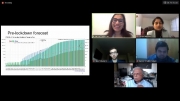The Coronavirus pandemic presents India, and the rest of the world, with difficult, painful public policy choices. The Economist magazine calls it a “A grim calculus. Covid-19 presents stark choices between life, death, and the economy.” These choices will become harder as India approaches the end of his historical, 21-day national lockdown, unprecedented in the history of mankind for its scale and urgency.
On Friday, April 10, NCAER hosted Professor Bhramar Mukherjee from the University of Michigan and members of the COV-IND-19 Study Group at its first NCAER Coronavirus Briefings Webinar to examine the threat to India posed by the Coronavirus and COVID-19, the disease it causes. The Group presented their modelling work and their findings that seek to answer questions of grave concern to India during and post the national lockout.
The COV-IND-19 Study Group at the Michigan University, an interdisciplinary group of scholars and data scientists, are using data and modelling to generate timely reports and recommendations about Covid-19 in India. Using daily Indian data on cumulative Covid-19 cases, recoveries and deaths, the Group is using an extended version of the SIR— susceptible, infected, and removed (recoveries & deaths) — model. Their model incorporates time-varying transmission rates that help predict the impact of the lockdown compared to other possible interventions on the number of cases over time. A Markov Chain Monte Carlo model implementation provides predicted proportions of cases over time with credible intervals. The Group has issued two briefings: pre-lockdown and post lockdown. The Group has put out an interactive app at covind19.org which shows short and long-term projections updated daily.
Professor Mukherjee was joined by members of the Study Group, Debashree Ray from the Departments of Epidemiology and Biostatistics, Johns Hopkins University, and Rupam Bhattacharyya, Maxwell Salvatore, and Lili Wang, all at the University of Michigan.
The webinar touched upon questions also addressed by the Group in their post lockdown brief:
- With the 21-day lockdown period in place, how many cases can we expect in India? How many fatalities can we expect in the next few weeks?
- Italy has been under lockdown since March 9, but as of April 4 had not seen an appreciable reduction in mortality or the number of cases. When can we expect to see a reduction in India?
- What will success under a lockdown look like?
- What can we expect after the lockdown is lifted — will the number of cases go back up? Number of deaths?
- Will the 21-day lockdown be long enough? Would a longer lockdown be more effective?
- How vulnerable are India’s healthcare/frontline workers with medical resources stretched?
- What should the Central and State governments be doing during and after the lockdown?
- What can people do during and after the lockdown?
- Why are there so many models and so many projections around, and why do they vary so much? How much should we rely on these projections?
For measuring this pandemic’s pulse, the Group talked about the role of data and data transparency, itself dependent on massive Coronavirus testing to generate the data and then on the regular, rapid release of accurate, credible data on susceptible, exposed, infected and removed (recoveries and death) cases. Over 170 participants from India and overseas joined the NCAER webinar. After the discussion, Mukherjee and colleagues answered questions from the participants.
Speakers:
Bhramar Mukherjee is the John D. Kalbfleisch Collegiate Professor and Chair, Department of Biostatistics, Professor, Department of Epidemiology, and Research Professor and Core Faculty Member, Michigan Institute of Data Science, all at the University of Michigan. Mukherjee is a fellow of the American Statistical Association and the American Association for the Advancement of Science. She is the recipient of several awards, including the Gertrude Cox Award from the Washington Statistical Society in 2016 and the 2020 L. Adrienne Cupples Award from the Boston University School of Public Health.
Debashree Ray is an Assistant Professor of Epidemiology and Biostatistics in the Johns Hopkins Bloomberg School of Public Health.
Rupam Bhattacharyya and Lili Wang are PhD candidates in Biostatistics at the University of Michigan.
Max Salvatore is a research area specialist in the Department of Biostatistics at the University of Michigan.






